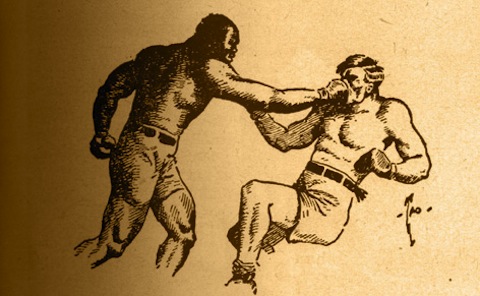
I’m the early stages of planning a new Wired project, one that will delve into the economics of how to properly compensate “ultra-specialists”—that is, people who possess the unusual ability to tackle extremely arcane tasks. I guess the classic example here would be those left-handed relief pitchers who make millions by appearing in a handful of innings each year. Or programmers who are fluent in outmoded languages, and so need to be paid handsomely to fix snafus in legacy systems that still underpin critical infrastructure.
A great character of yore who made a mint off a strange talent was the man born Saverio Giannone, better known to fans of pugilistic history as Joe Grim. By his own admission, Grim had no fighting skills to speak off—he could barely hit hard enough to break a piece of tissue paper, and his open stance and slow feet made him easy to strike. Yet like Homer Simpson, Grim had an amazing knack for absorbing the worst physical punishment imaginable—his claim to fame was that you simply couldn’t knock him out. This great history of Grim’s bizarre, loss-filled career includes a fantastic tidbit regarding the man’s 1905 run-in with then-rising heavyweight star Jack Johnson:
Even though Johnson weighed 210 to only 165 for Grim, there were still doubts he could put the human punching bag away. Confident of his punch, Johnson had wagered heavily that he’d knock the man out.
Some 3000 people, including Nat Fleischer, future founder of The Ring, paid to see the match in Philadelphia and it would be even money on which fighter was the main draw. In the first three rounds Grim was beaten around the ring. He would drop and the crowd would shout, “Get up Joe!” and Joe would get up, a broad grin on his bloodied face. In the fourth Johnson landed a punch that dropped his opponent to the floor with a thud. Grim waited on hands and knees as the referee counted, then jumped up before the count of “ten”. Three more times he went down in the round, three more times he got up. The forth round followed suit, and in his corner, an amazed Jack Johnson declared, “He ain’t human.”
In the fifth Grim was down six times, three times for a count of eight and three times for a count of nine. Each time he rolled to his belly, climbed to his knees, and waited for the referee to “almost” count him out before rising amid the cheers of the crowd. It wasn’t boxing, it was a circus act with the lion tamer letting the lions do their worst, then leaving the cage savaged and bloody to take his bows.
The sixth and final round saw a desperate Johnson trying to win his bets. Jack caught Grim with a right to the chin so hard, as Nat Fleischer said, “. it caused Grim to turn a complete somersault.” The referee counted as Grim lay there senseless, some thought dead. It appeared he wouldn’t beat the count, but on eight the bell rang, ending the fight and saving Grim from his first knockout. He had been knocked down eighteen times by one of the hardest punchers of his time but he hadn’t been counted out. In Grim’s mind, the defeat was a victory of the only sort he would ever know. More fights followed and the Iron Man didn’t disappoint the fans of that cruder era. He didn’t win, but he didn’t fail to shout out after the final bell, “I’m Joe Grim! Nobody knocks out Joe Grim!”
Popular lore holds that Grim never actually won a fight, but his thorough BoxRec entry suggests that he tasted the thrill of victory on roughly five occasions—versus 33 losses. How long the sweet memories of triumph existed in his mind is anyone’s guess; my hunch is that Grim’s mental faculties did not fare well in his post-career years, given the trauma his brain endured in the ring.
(Image via Antiquities of the Prize Ring)


Interesting subject // Sep 23, 2011 at 12:56 pm
I love your articles man. There really are so many arcane subjects that lingers in our existence just beneath
the surface of mankind .
Brendan I. Koerner // Sep 23, 2011 at 1:25 pm
Many thanks, and well-put. I couldn’t agree with you more, which is why I do what I do.
Captured Shadow // Sep 23, 2011 at 1:51 pm
Great topic. How to value that kind of talent? It has to do with focusing your talent on large market. A friend of mine made a machine to help sort shrimp from the rest of the catch on fishing boats. Great invention, but such a small market that he only broke even selling them for a couple years. Now if he had invented a better corkscrew ……….